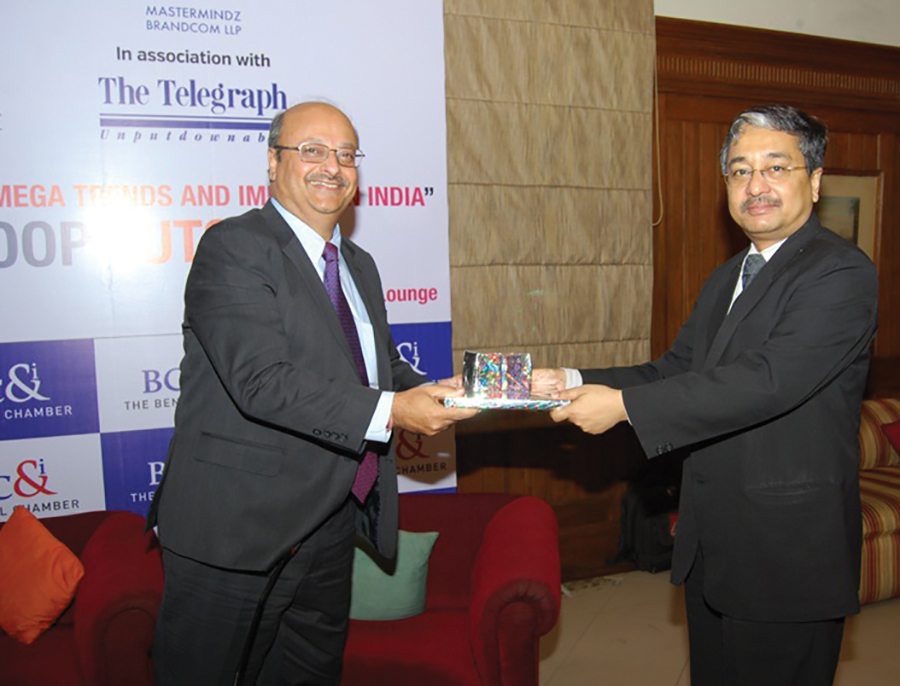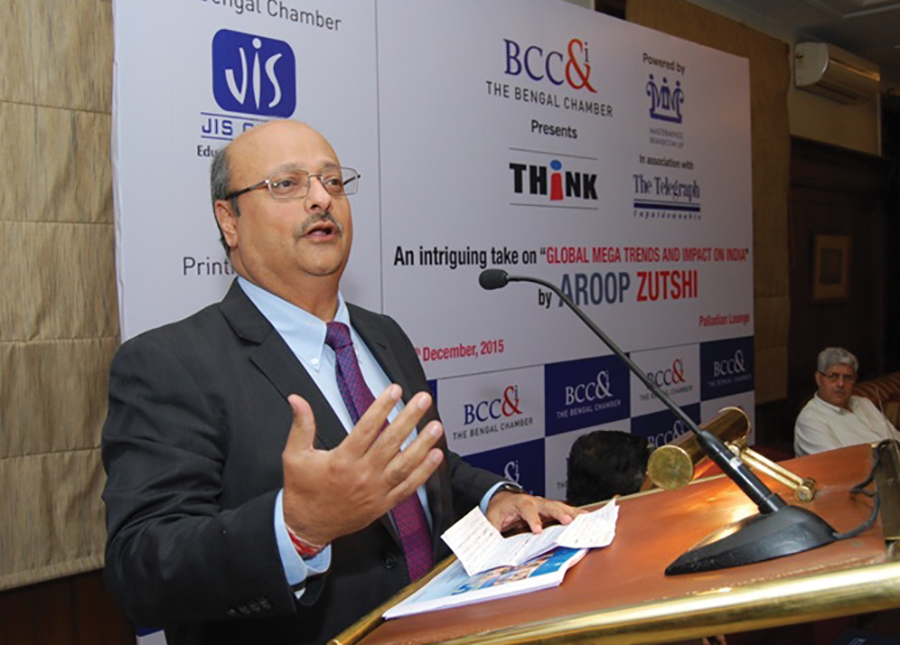- The Bengal Chamber “Think…” Session with Mr. Aroop Zutshi, Global President & Managing Partner, Frost & Sullivan, 7th December 2015, The Palladian Lounge
The Bengal Chamber, nearly 4 years ago started off the “Think” series of lectures, with the intention of providing our members and the audience a forum to listen to eminent personalities on issues of contemporary relevance spanning the economy, business, industry, the social context, issues of national importance and the like. With the quality of Speakers that we have been privileged to have, we hope you will appreciate that your Chamber has been very successful in its efforts.
The Bengal Chamber, presented another THINK Session on Dec 07, 2015 powered by Mastermindz Brandcom in association with The Telegraph with Mr Aroop Zutshi, Global President & Managing Partner, Frost & Sullivan, and the topic was on “Global Mega Trends and Impact on India”
Mr Aroop Zutshi is the Global President & Managing Partner, Frost & Sullivan. He is based in Mountain View California, and sits on the corporate board of Frost & Sullivan Inc. As the Global President & Managing Partner, with over 30 years of experience Mr. Zutshi has been involved in developing the growth strategy for the company. Aside from driving the globalization of Frost & Sullivan, he has also been responsible for Frost & Sullivan’s expansion of business across 43 office locations globally. Besides being responsible for managing Frost & Sullivan, Mr. Zutshi also works with Fortune 500 companies in designing their growth strategies by evaluating new opportunities for growth.
As a global thought leader, Mr Zutshi has been instrumental in facilitating some important initiatives of Govt of India as well as many state governments in Asia, Europe & America.
Mr. Zutshi started with defining Global Mega Trends. Mega Trends are transformative global forces that define the future world with their far reaching impact on business, societies, economies, cultures and personal lives. Indian companies like OLA, Flipkart etc are making global headlines.
Number of connected devices is increasing fast. People are updating themselves with new things. The Indian Government is expected to generate a huge amount of relevant Big Data (UID & Banking for all). India’s digital economy is on the rise. Digital economy which is now just 1% of the total country’s GDP is expected to grow up to 7% in the near future. Mr. Zutshi stressed the importance of the world of Connectivity and Convergence; laying out a method and strategic roadmap, which can help companies navigate within such a transformational business environment. “Innovation remains the cornerstone of driving sustainable revenue, growth, and our futures; hence companies must focus on not just becoming, but being Visionary Innovators. This will support the development of products to address unmet customer needs and even some of the world’s big global challenges,” remarked Mr. Zutshi. Mr. Zutshi insisted on the point of foresightedness for the enterprises. Indian companies are not lacking much behind compared to other international players. Adaptation and implementation of new technologies will become key to success and give long lasting sustainability to the enterprises. With the advent of new technologies, Indian enterprises are able to connect to a global customer base. Physical boundaries are shrinking and the market size is getting broader day by day.
He also said that smart cities are going to be the future. It is cities and not the countries which will drive Wealth Creation. What is a smart city? Smart city is a combination of Smart Governance, Smart Energy, Smart Building, Smart Mobility, Smart Infrastructure, Smart Technology, Smart Healthcare and Smart Citizen. Another mega trend that Mr. Zutshi mentioned was that of women empowerment. Number of working women has increased many folds. Companies are now making tailor made solutions for women to increase revenue. Banks feel more secure lending money to working class women as compared to their male counterparts, as they have lower probability of default. Studies show that women use their loans more productively. Mr. Zutshi was also very positive about the Prime Minister’s “Make in India” initiative. He also shared his belief and views that a manufacturing led economy can eradicate poverty much faster than a service led economy.

 Annual General Meeting 2015
Annual General Meeting 2015 Agro and Rural Development
Agro and Rural Development City of Analytics
City of Analytics Economic Affairs
Economic Affairs Education
Education Entrepreneurship Development
Entrepreneurship Development Energy and Environment
Energy and Environment Exhibitions and Trade Fairs
Exhibitions and Trade Fairs Finance and Banking
Finance and Banking Health
Health HR / IR
HR / IR Information Technology
Information Technology Infrastructure
Infrastructure International Relations
International Relations International Trade Cell
International Trade Cell Leadership Lecture
Leadership Lecture Legal
Legal Metals & Mining
Metals & Mining MSME Development, Manufacturing and Allied Activities
MSME Development, Manufacturing and Allied Activities North Bengal
North Bengal Projects
Projects Shipping
Shipping Skill Development
Skill Development Social and Cultural
Social and Cultural Sports
Sports Taxation
Taxation Think Series
Think Series Tourism and Heritage
Tourism and Heritage Training Programmes and Workshops
Training Programmes and Workshops Other Programmes
Other Programmes Press Clippings
Press Clippings Appendix
Appendix Download
Download



